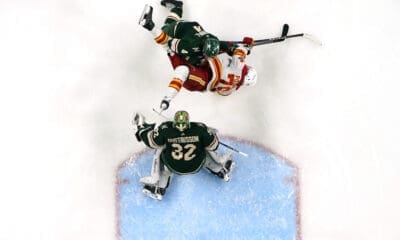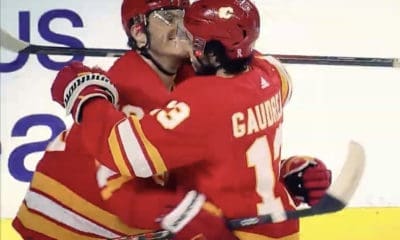Calgary Flames
On the Flames and discipline

Last summer I wrote on the topic of penalty differentials and why it's a good idea for clubs to shoot for a high positive number when it comes to taking and drawing penalties. Short story: it doesn't replace being really good at special teams, but having a positive penalty differential has some effect on goal differential.
This past season, Calgary actually finished with a positive PD for the first time in ages: 358 PP – 349 SH = +9, resulting in nominally positive ST GD of +3. Of course, there are two main ways the club could have improved that GD number significantly: improve the PP (right Keenan?) which was in the bottom third of the league, or take less penalties. Despite the positive differential, Calgary was still 11th in the league in terms of times shorthanded and 9th in the league in terms of total minors taken (403), which I assume means more than a few power plays were wiped out by ill-timed minors.
Taking a lot of penalties has a number of effects on scoring, over and above the obvious “allowing more goals on the PK”: it suppresses the club’s ability to score, reduces playing time for some of the best players on the team and, as noted, can wipe out power play opportunities if minors are taken at the wrong time. Taking lots of minors in a season also increases the chances of suffering the dreaded 5-on-3: the most offense rich environment in the league (the Flames gave up six 5-on-3 goals, for example). As such, not only should clubs seek to drive a positive penalty differential, they should do so by trying to take as few minors as possible. Back to last year, if the Flames had taken, say, a median number of minors (350), they could have added to their GD in potentially three ways: by giving up less power play goals against, by scoring more power play goals for and by playing more at even-strength.
It's hard to directly quantify how much 47 less minors would have effected each condition since we don't know when they would have been hypothetically applicable, but let's say 85% of the Flames minors led to the team being shorthanded. That's approximately 40 less 5on4 events over the course of the season. At the Flames 83.4% PK rate, 309 times shorthanded = 51 PP goals expected goals against, or 10 less goals than the 61 Calgary actually gave up. And that doesn't account for the extra time spent at ES (which was the team's strength) as well as on the power play.
So are the Flames poised to improve by this measure next year? Maybe.
The New Jersey Devils were well disciplined under Brent Sutter last season, taking just 354 minors and being short-handed 324 times. In addition, the Flames lost Todd Bertuzzi‘s 1.4 minors/60 minutes of ice and added Nigel Dawes and Fredrik Sjostrom, who were both net positives in terms of penalties last year. Gone also are Wayne Primeau and Jim Vandermeer who both took more minors than they drew, as did Adrian Aucoin and even Matthew Lombardi. Of the newer additions heading into the next season, only Olli Jokinen and Jay Bouwmeester had a negative PDs in 08/09. I don’t know what effect McGrattan will have, although Im hoping he’ll play rarely enough as not be a major factor.
Calgary has historically been a high penalty team under Sutter, given the fact that he prefers the club to have a mean, "take no guff" attitude. And while Im sure that may have it's advantages, I'd probably prefer to see the team to take less penalties while doing it going forward.
by Kent Wilson






